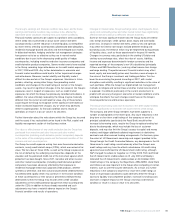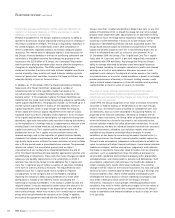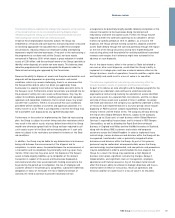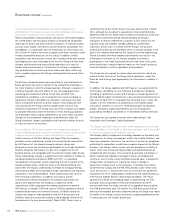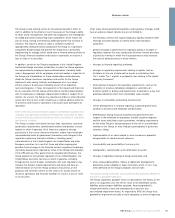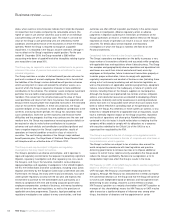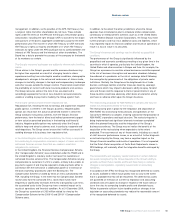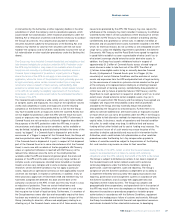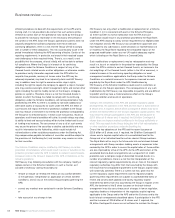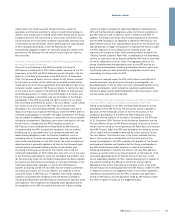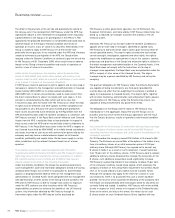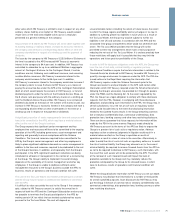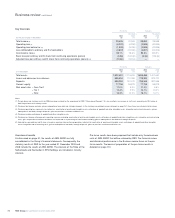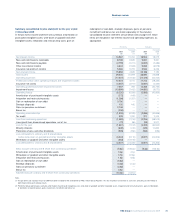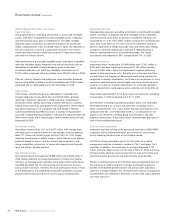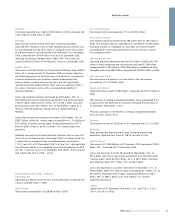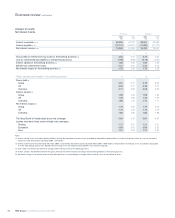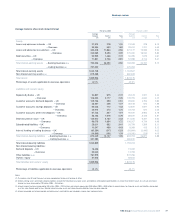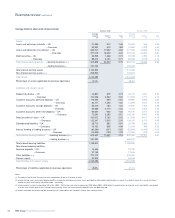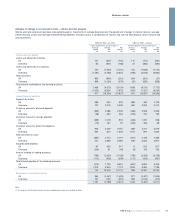RBS 2009 Annual Report Download - page 71
Download and view the complete annual report
Please find page 71 of the 2009 RBS annual report below. You can navigate through the pages in the report by either clicking on the pages listed below, or by using the keyword search tool below to find specific information within the annual report.
69RBS Group Annual Report and Accounts 2009
Business review
capital ratios, this could cause the Group’s business, results of
operations and financial condition to suffer, its credit rating to drop, its
ability to lend and access to funding to be further limited and its cost of
funding to increase. The occurrence of any or all of such events may
cause the price of the securities to decline substantially and may result
in intervention by the Authorities, which could include full nationalisation
or other resolution procedures under the Banking Act. Any
compensation payable to holders of securities would be subject to the
provisions of the Banking Act and investors may receive no value for
their securities.
The costs of the Group’s participation in the APS may be greater than
the amounts received thereunder.
The costs of participating in the APS incurred by the Group to
HM Treasury include a fee of £700 million, paid in advance for the first
three years of the APS and £500 million per annum thereafter until the
earlier of (i) the date of termination of the APS and (ii) 31 December
2099. The fee may be paid in cash or, subject to HM Treasury consent,
by the waiver of certain UK tax reliefs that are treated as deferred tax
assets (pursuant to the three agreements which provide the right, at the
company’s option, subject to HM Treasury consent, to satisfy all or part
of the annual fee in respect of the APS and £8 billion of B shares and
the dividend payments (if made) on the £25.5 billion of B shares, and
the exit fee payable in connection with any termination of the Group’s
participation in the APS, by waiving the right to certain UK tax reliefs
that are treated as deferred tax assets (“Tax Loss Waiver”) or be funded
by a further issue of B shares to HM Treasury. On exit the fees
described in the risk factor below entitled “the company may have to
repay any net pay-outs made by HM Treasury under the APS in order to
terminate its participation in the APS” will apply. Furthermore, the Group
may be subject to additional liabilities in connection with the associated
intra group arrangements. Significant costs either have been or will also
be incurred in (i) establishing the APS (including a portion of
HM Treasury’s costs attributed to the Royal Bank by HM Treasury),
(ii) implementing the APS, including the company’s internal systems
building and as a consequence of its on-going management and
administration obligations under the Scheme Conditions, such as
complying with (a) the extensive governance, reporting, auditing and
other continuing obligations of the APS and (b) the asset management
objective which is generally applied at all times to the Covered Assets
and will require increased lending in certain circumstances and
(iii) paying the five-year annual fee for the initial B shares and the
Contingent Subscription of £320 million less 4 per cent. of: (a) the value
of any B shares subscribed for under the Contingent Subscription; and
(b) the amount by which the Contingent Subscription has been reduced
pursuant to any exercise by the company of a partial termination of the
Contingent Subscription (payable in cash or, with HM Treasury’s
consent, by waiving certain UK tax reliefs that are treated as deferred
tax assets (pursuant to the Tax Loss Waiver), or funded by a further
issue of B shares to HM Treasury). In addition, there will be ongoing
expenses associated with compliance with the Scheme Conditions,
including the Royal Bank and HM Treasury’s professional advisers’ costs
and expenses. These expenses are expected to be significant due to
the complexity of the APS, the need to enhance the Group’s existing
systems in order to comply with reporting obligations required by the
APS and the Royal Bank’s obligations under the Scheme Conditions to
pay HM Treasury’s and its advisers’ costs in relation to the APS. In
addition, the Group has certain other financial exposures in connection
with the APS including (i) an obligation to indemnify HM Treasury, any
governmental entity or their representatives and (ii) for the minimum two-
year period from a Trigger until payment is made by HM Treasury under
the APS, exposure to the funding costs of retaining assets and
exposures on its balance sheet whilst receiving interest based on the
“Sterling General Collateral Repo Rate” as displayed on the Bloomberg
service, or such other rate as may be notified by HM Treasury from time
to time as reflecting its costs of funds. The aggregate effect of the
joining, establishment and operational costs of the APS and the on-
going costs and expenses, including professional advisers’ costs, may
significantly reduce or even eliminate the anticipated amounts to be
received by the Group under the APS.
The amounts received under the APS (which amounts are difficult to
quantify precisely) may be less than the costs of participation, as
described above. There are other, non-cash, anticipated benefits of the
Group’s participation, which include the regulatory capital benefits
referred to above and the potential protection from future losses, which
are themselves also difficult to quantify.
The company may have to repay any net pay-outs made by HM Treasury
under the APS in order to terminate its participation in the APS.
During its participation in the APS, the Royal Bank will pay an annual
participation fee to HM Treasury. The annual fee, which is payable in
advance, is £700 million per annum for the first three years of the
company’s participation in the APS and £500 million per annum
thereafter until the earlier of (i) the date of termination of the APS and
(ii) 31 December 2099. Pursuant to the Accession Agreement and the
Tax Loss Waiver, subject to HM Treasury consent, all or part of the exit
fee (but not the refund of the net payments the Royal Bank has received
from HM Treasury under the APS) may be paid by the waiver of certain
UK tax reliefs that are treated as deferred tax assets (pursuant to the
Tax Loss Waiver). The Directors may, in the future, conclude that the
cost of this annual fee, in combination with the other costs of the
Group’s participation in the APS, outweighs the benefits of the Group’s
continued participation and therefore that the Group’s participation in
the APS should be terminated. However, in order to terminate the
Group’s participation in the APS, the Group must have FSA approval
and pay an exit fee which is an amount equal to (a) the larger of (i) the
cumulative aggregate fee of £2.5 billion and (ii) 10 per cent. of the
annual aggregate reduction in Pillar I capital requirements in respect of
the assets covered by the APS up to the time of exit less (b) the
aggregate of the annual fees paid up to the date of exit. In the event
that the Group has received payments from HM Treasury under the APS
in respect of losses on any Triggered Assets, it must either negotiate a
satisfactory exit payment to exit the APS, or absent such agreement,
refund to HM Treasury any net payments made by HM Treasury under
the APS in respect of losses on the Triggered Assets.


